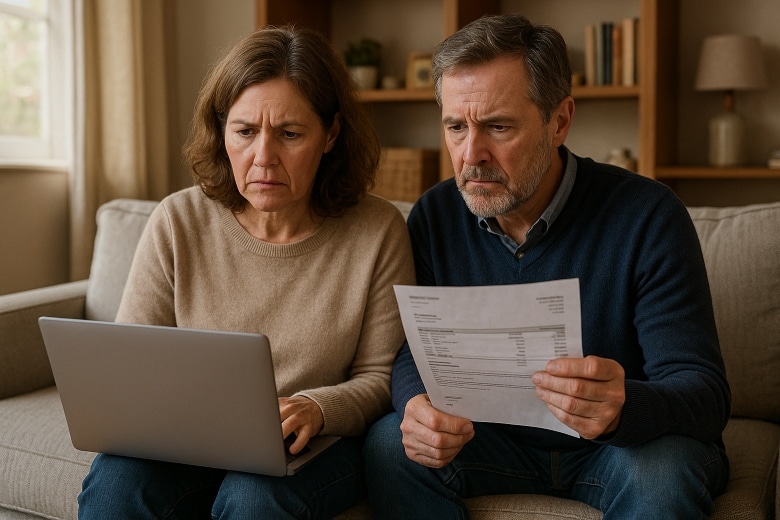
Is It Better To Pay It Off A Mortgage Or Invest Surplus Money?
This is an updated version of a previous post which was written before the world went a bit crazy which you can read here.
The Bank of England has raised interest rates already this year to combat rising inflation and further increases are expected. As a result mortgage interest rates will rise from very low rates too. It is likely the days of very cheap borrowing are over.
So, if you have surplus income or cash sitting around is it better to reduce your mortgage or invest the money in your pension or ISA instead?
On A Spreadsheet Investing Will Always Win. But You Are Not A Spreadsheet.
If you know your way around Excel or Google Sheets you could build a simple calculator that will help you work out the difference between reducing your debt or investing for a higher return. Even if you use conservative investment returns, the long-term returns on an investment portfolio should be expected to generate higher returns than the cost of borrowing. On that measure, a spreadsheet will always show you are better off investing rather than reducing debt.
But you are not a spreadsheet. You have emotions and not being in debt may be really important to you. Being debt-free is never a bad thing, especially if provides you with a feeling of security. I don’t know of anyone who regretted the day they became mortgage-free but there are other considerations.
Are You Comfortable With Uncertainty?
This is where your attitude to investment risk and your financial position comes in. Investing money requires you to be comfortable with uncertainty. Since the 2007-09 financial crash the global investment markets have enjoyed over a decade of strong returns, but it has not been without periods of decline: 2018 was a negative year, markets fell by about 1/3 during the height of the Coronavirus pandemic and 2022 has seen markets fall on the back of the high cost of living, the Ukraine crisis and global supply issues.
If you invest for the medium to long term (5 years plus) you should benefit from growth on your investment. If you would not be comfortable experiencing, or can’t afford to experience investment losses then you are most likely better off reducing or paying off your mortgage debt.
While higher returns are by no means guaranteed, history shows that for the patient and disciplined investor investing in stock markets provides a greater opportunity for long-term returns than any other asset (including bricks and mortar for any property junkies out there). The benefits are even greater if you re-invest the income generated from an investment portfolio. This video provides some tips on how to invest wisely.
What Else Is Going On In Your Life?
Timing also comes into it. If the end of your mortgage term is on the horizon, say within 5 years, and you have an interest-only mortgage, a fall in the stock markets is going to be hard to recover from. You may find you have less than you started with when your mortgage term ends. You may be able to increase the term as you wait for markets to recover but in this scenario, you are probably better to reduce your mortgage.
It may be that you are expecting a future capital expenditure, to complete some home improvements for example. If this is the case maintaining a small mortgage balance or opting for an offset mortgage (you have a savings account linked to the mortgage with the same interest rate so the cost of the mortgage is offset by the savings interest you receive) keeps your options open. If you need access to mortgage finance it will be more readily available than if you had to apply for a mortgage again.
In summary, if you are asking yourself “should I pay off my mortgage?”, it is a very personal decision. You should consider your current financial situation and how you see that changing in the future. But, as I said at the top of this post, nobody I know regretted being mortgage-free.
What About Surplus Income?
If you have surplus income, perhaps because the children have now left home, the case for investing is a bit stronger. Falling markets are on the side of the regular investor. If you are saving £500 a month into a falling market each month you are buying shares at a cheaper price. Come the stock market recovery you will own more shares in the great companies of the world at a lower price so will benefit more from the recovery. In financial parlance, this is known as pound cost averaging.
Pension or ISA?
If you have decided that you are willing to invest rather than reduce the debt the next decision is whether you invest in a pension or ISA.
The benefit of investing via a pension is the addition of tax relief to your contribution. For every contribution made the Government supplements it with a 20% top-up to encourage people to save for their retirement. Higher rate and additional rate taxpayers can also claim additional tax relief against their higher income. However, there are limits on how much can be paid into a pension each year which might not make it possible to pay in larger sums. You can find out more about those pension contribution allowances here.
Your age is another important factor to consider. At present, the earliest you can access a pension is 55 but that is set to increase to 57 from 2028. If you need to pay off your mortgage prior to then your money won’t be much use to you locked away in a pension. In this situation, an ISA may be more appropriate.
ISAs also trump pensions on their tax treatment when you wish to withdraw money. Not only can you take the money out at any age, any gains made on the investment are also free of tax within an ISA. Pensions are limited to a 25% tax-free lump sum with any additional capital withdrawn in a tax year liable to income tax. This raises the prospect of paying up to 45% if a high level of income is withdrawn or you are still working in the year you wish to pay off your mortgage.
You can read more about pensions versus ISAs here.
In summary, if you are wondering whether you should pay off your mortgage or invest, it is a very personal decision. You should consider your current financial situation and how you see that changing in the future. A lot of people may be better off investing but, as I said, nobody I know regretted being mortgage-free.
Photo by Tierra Mallorca on Unsplash






